According to statistics, inflammation of the prostate occurs in 15% of the male population. It is a dangerous disease that, without treatment, leads to the formation of cysts and stones in the prostate gland, erectile dysfunction (impotence) and infertility. You need to know the symptoms of prostatitis so you can see a urologist in time and cure the disease without consequences. Inflammation is divided into acute and chronic forms, each of which has distinctive features.
Symptoms and symptoms common to all types of prostatitis
Despite the fact that prostatitis is acute and chronic, experts have identified a number of common signs and symptoms in men that lie in both conditions: the main one is the first and the others.
Moderate pain in the perineum and scrotum
Feeling of pain and tightness in the groin is the first sign of prostatitis in men. The symptom is constantly worrying. The pain increases and decreases. A person cannot accurately indicate the localization of discomfort because pain is often given to the lower, sacral region of the back.
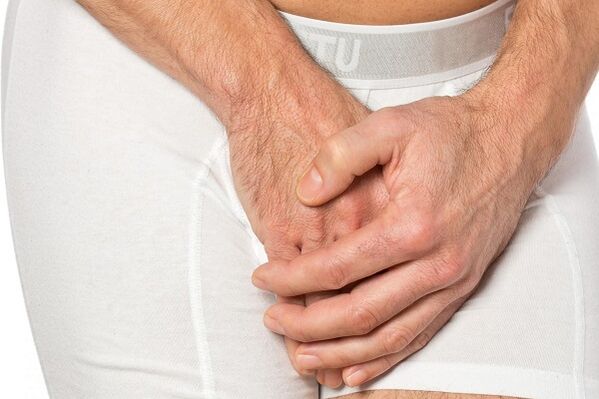
When a symptom appears, the person tries to sit or lie down, bending his knees slightly to his stomach.
Painkillers from the group of non-steroidal anti-inflammatory drugs (NSAIDs) are used to treat discomfort. The drugs have a good analgesic effect and do not cause serious side effects.
Not recommended for men with gastritis or gastric ulcer.
Increased urination (pollakiuria)
With prostatitis, a person starts running to the toilet every 1, 5-2 hours. If you drink a few liters of beer or too much water in the heat, the condition becomes completely unbearable: the urge to appear every 20-30 minutes.
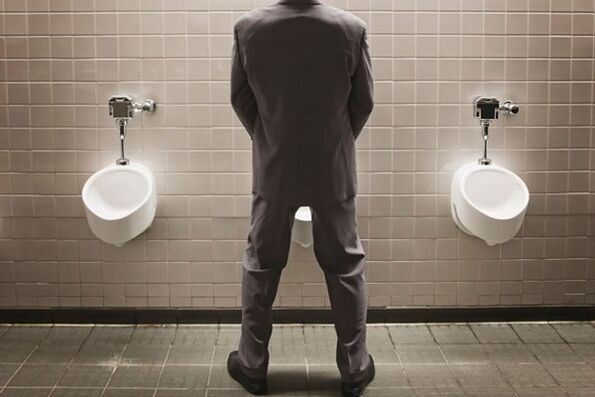
After entering the toilet, incomplete urination is felt.
For pollakiuria, no tablets help. The "drink less water" option also does not work in this case. Desires can occur even when there is little urine in the bladder.
Malaise
Weakness and weakness often occur at the very beginning of the disease. Many don’t attach much importance to them, they attribute everything to overtime.
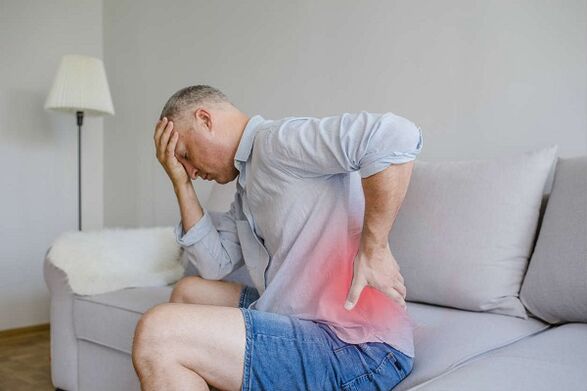
If a man over the age of 40 suddenly has severe fatigue, incomprehensible painful feelings in the muscles and joints, and a decrease in interest in work, this may indicate the development of prostatitis. This symptom alone does not allow the diagnosis of the pathology, but in combination with 2-3 other symptoms, inflammation of the prostate is very likely.
In order to improve his well-being, one needs to rest more, normalize one’s daily routine. Good sleep for 7-8 hours is very important and you should fall asleep by 23 hours at the latest. Vitamins will have a good effect both in their natural form and in the form of dietary supplements (its use is recommended after personal consultation with a specialist).
Slow urination
Urination with too weak and short flow, spraying in all directions is a typical complaint of men who face inflammation of the prostate gland. Seeing such a problem, one tries to force and squeeze out a "huge current", but nothing comes of it. In the case of prostatitis, it is the slow flow that is characteristic, not the release of urine in drops, which is more often observed in the middle and late stages of development in prostate adenoma.
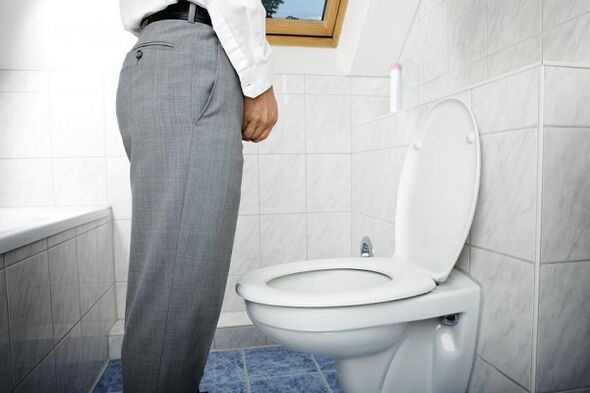
The symptom is primarily accompanied by swelling or dystrophic changes in the tissues of the prostate gland that block the lumen of the urethra. Non-steroidal anti-inflammatory drugs that relieve swelling may provide some relief in the acute process, but are ineffective in chronic inflammation. Prostate massage makes it possible to remove edema at home, but for this a person needs to have certain abilities.
Mucosal secretions from the urethra
Secretion drops appear on the glans penis during the day. The discharge is due to the self-massage of the prostate, which occurs during fast walking, sports and running. As a result, some of the inflammatory secretion moves along the urethra and is released outward. Often the mucus is cloudy, has an unpleasant odor, sometimes has a faint color.
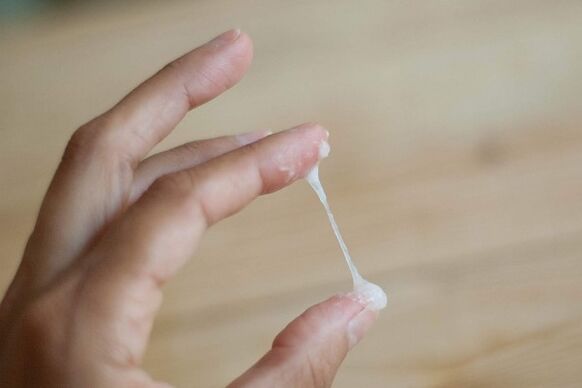
Men who experience symptoms must adhere strictly to hygiene. The genitals should be washed at least 2-3 times a day as the secretions accumulated on the head are an excellent medium for the growth of pathogenic bacteria. The genitals can be rinsed with an antiseptic solution or chamomile decoction to help kill harmful microorganisms.
Pain when urinating
A symptom of prostatitis is cramps and burning sensations (burning sensation) in the urethra during urination. The discomfort is more pronounced in the morning as large amounts of inflammatory secretions accumulate in the prostate during the night. Resi worries the person not only during the act but also within 15-20 minutes after it.
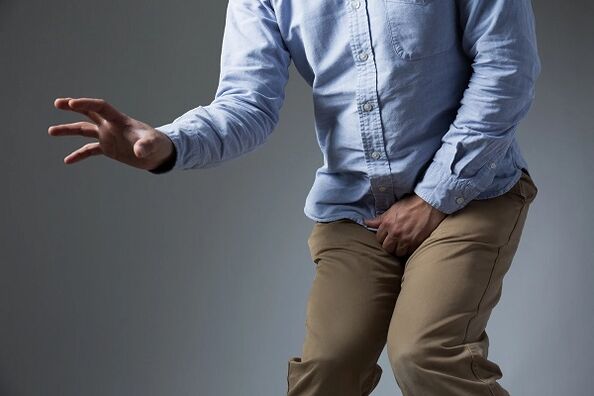
You can use medications from the group of herbal uroseptics to reduce discomfort. The drugs have antimicrobial and anti-inflammatory effects, relieve symptoms and prevent inflammatory diseases of the urethra underlying prostatitis.
An essential urge
Men describe this feeling as a sudden and painful urge to urinate. She’s afraid of "not reaching" because the feelings are painful and very strong.
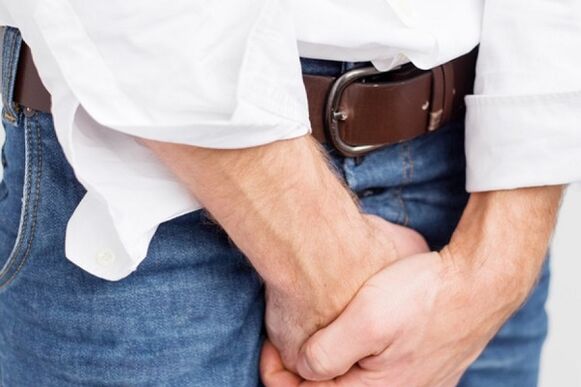
Often a false urge occurs when urine flow does not occur and after a few minutes the pain subsides. Sometimes this symptom is accompanied by urinary incontinence when a few drops of fluid appear in the laundry.
The only suggestion from doctors in such a situation is not to try to tolerate the urge. Frequent visits to the toilet cause psychological discomfort, but when they try to compress the muscles vigorously, the pain increases.
Acute prostatitis: what hurts at the same time and how the disease feels
There are 9 distinguishing symptoms of acute prostatitis in men, which are mainly observed with a sharp manifestation of inflammation of the prostate gland. We will tell you about each of them in detail.
Tormenting lumbar pain
Men complain of severe cramps, cramps and unpleasant throbbing in the lumbar region.
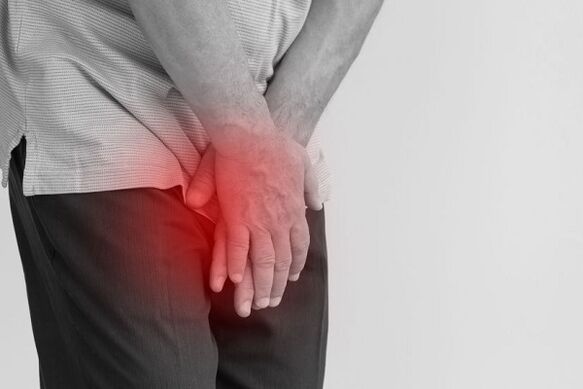
The pain constantly worries the person, increases the prolonged immobile sitting position, urination. Sometimes the pain is so severe that it is impossible to walk normally.
The symptom occurs suddenly, may be preceded by hypothermia or unprotected sex.
The discomfort needs to be addressed. Painkillers are used to quickly relieve the symptoms of prostatitis in men. NSAIDs are the drugs of choice.
Month
The active inflammatory process of the prostate gland is always accompanied by an increase in temperature. In acute prostatitis, the fever reaches 39-39. 5 ° C. Body temperature rises suddenly, sometimes preventing the onset of pain or other characteristic symptoms.

The symptom may be accompanied by alternating chills and increased sweating.
Temperatures above 38 ° C must be reduced. Conventional antipyretics are sufficient. Acetylsalicylic acid should not be used to lower the temperature. Used improperly, it has many proven side effects, so it’s best to stick to safe products.
Cloudy urine
Prostatitis releases inflammatory secretions from the gland that appear during urination.
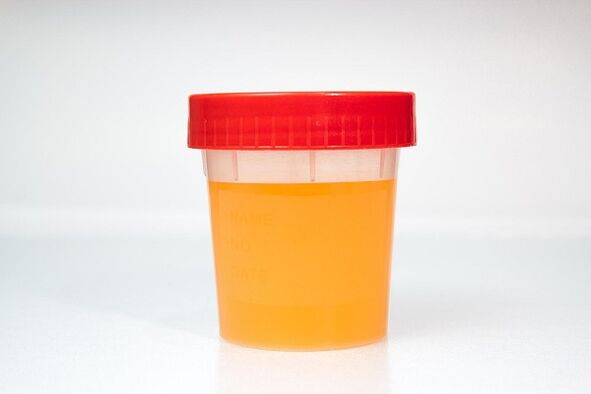
As a result, the urine becomes cloudy, sometimes showing some mucus or pus inclusions. Inflammation of the prostate gland is characterized by a change in the last part of the urine, while at the beginning of urination the stream has a familiar appearance. Turbidity is often accompanied by an unpleasant odor.
If such a symptom occurs, it is advisable to use drugs from the uroseptic group. Here, it is not herbal medicines, but antibacterial drugs that are more effective in this particular case.
Purulent discharge from the urethra
The appearance of a few drops of pus from the mouth of the urethra is a typical sign of bacterial prostatitis.
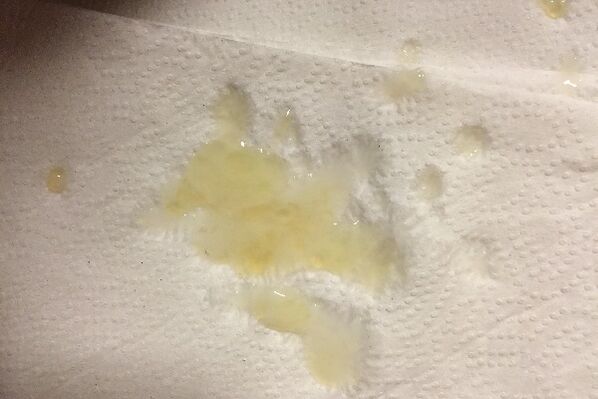
The symptom may occur during the day and at the end of each urination. If prostate disease is caused by trichomoniasis, gonorrhea, or other sexually transmitted infections, foamy, foul-smelling pus can develop profusely.
Symptomatic treatment is performed with uroseptics. Men are advised to observe hygiene and regularly wash the lumbar area with chamomile or antiseptic solution to prevent irritation and maceration of the skin of the penis.
However, it is important to start antibiotic therapy as soon as possible to prevent complications with seemingly harmless discharge.
Urinary retention
With acute edema of the prostate gland, urination is impossible because the lumen of the initial urethra is completely occluded. The man feels the urge to go to the toilet, the feeling in the suprapubic region is full.
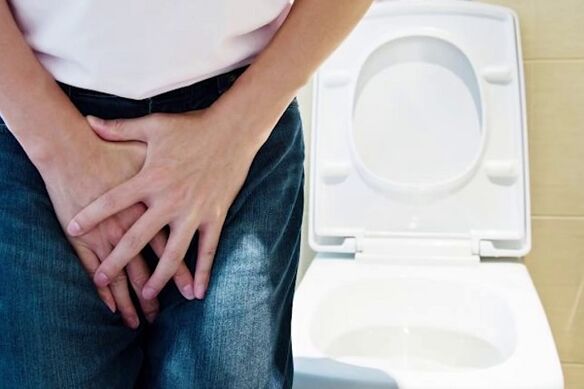
When you try to urinate, the pain increases, but there is no result.
Herbal preparations containing, for example, sabal fruit extract help in the fight against urinary retention. They make it easier to empty the bladder and relieve the excruciating suprapubic discomfort.
Headache
Symptoms of acute prostatitis are manifestations of intoxication. The inflammatory process of the prostate gland is accompanied by the production of specific biochemical markers that affect the condition of the whole organism.
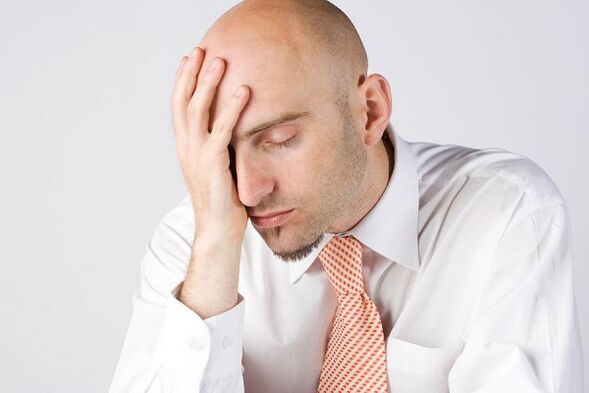
The disease is often accompanied by a high fever, which is accompanied by a headache of a pressing or astringent nature.
Analgesics of the NSAID group are suitable for pain relief. If the discomfort is mild, medication may be omitted.
Painful bowel movements
When the bowels are emptied, there is strong pressure on the inflamed gland, so the man feels sharp pain. Sometimes the pain becomes so intense that the person tries to restrain the urge not to feel discomfort.
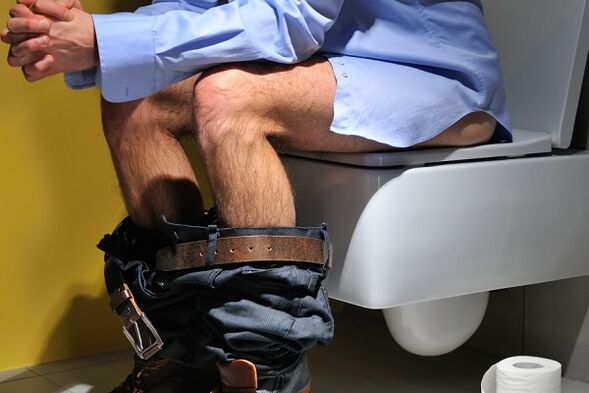
Occasionally, in case of prostatitis, tenesmus is observed - a "failed" painful desire to defecate.
Unpleasant sensations cannot be dealt with at home. The pain only disappears after the acute inflammatory process has subsided. Do not hold back the desire for bowel movement, as constipation may occur, which aggravates the situation.
Lumbosacral pain
An unpleasant symptom of prostatitis is a consequence of general nervousness (supply of nerve endings) in the pelvic organs, as a result of which the pain spreads to nearby parts of the body.
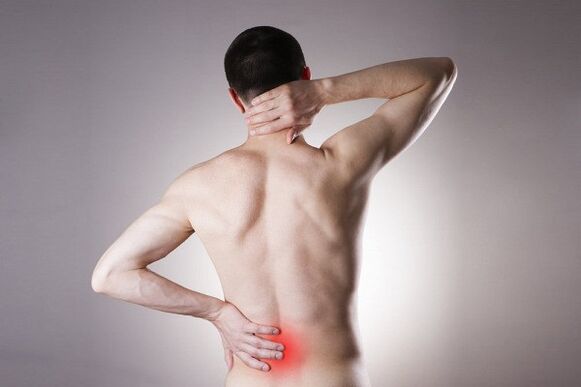
The pain can be dull, sore or sharp. Sharp "lumbago" in the lumbar region, which occur during exertion, defecation, and urination, are also typical.
Analgesics in the NSAID section are suitable for the relief of the symptom. To alleviate the discomfort, do not use hot baths or warming of the lumbar zone, as this may intensify the acute inflammatory and purulent process, accelerating its development.
Physical pains
The symptom develops as a component of intoxication syndrome in prostatitis. The man complains of discomfort in the joints and muscles: they seem to twist, stretch and tighten at the same time.
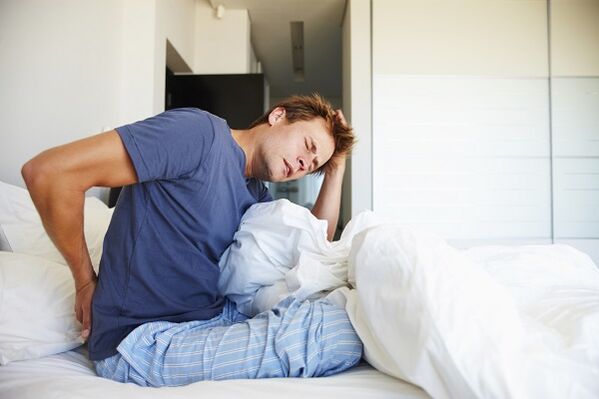
Feeling unwell is similar to developing a cold or flu.
There are no medications or folk remedies to eliminate the discomfort. This symptom occurs primarily in the background of fever, so after hitting the temperature (in any convenient way) the body’s pain disappears and the health improves.
Diagnosis of chronic prostatitis at home with symptoms
Chronic prostatitis is distinguished by a number of signs, so it can be diagnosed at home before consulting a urologist.
Painful ejaculation
Unpleasant feelings bother the person as they approach orgasm: pulling pains begin in the scrotum and perineum that the penis receives. Discomfort reaches its maximum intensity during ejaculation, when a person may experience sharp spastic pains.

This situation is repeated during each intercourse, but the intensity of the painful feelings varies.
To reduce discomfort, urologists recommend that the man be in regular contact (at least twice a week). This helps to eliminate the congestion of the prostate gland. After ejaculation, warm sitting baths help relieve pulling pain.
Frequent night trips to the toilet
Symptoms of chronic prostatitis include nocturia - an abnormally frequent urination at night. The patient must wake up 2-3 or more times to go to the toilet.
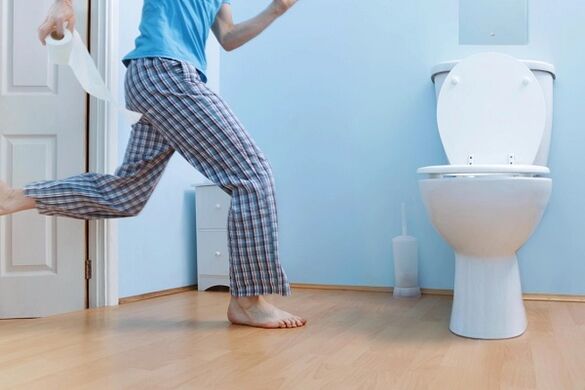
The urge to urinate is quite painful, and urination is accompanied by discomfort in the perineum and lower abdomen. The symptom can occur regardless of the amount of fluid you drink at night.
There are no symptomatic treatments. To reduce the frequency of nocturnal awakenings, you should limit your drinking water and evening drinks, try to empty your bladder completely before going to bed.
Constipation
The size of the prostate gland increases and pushes the rectum, making bowel movements difficult. Men complain of persistent constipation lasting 3-4 days or more. When you try to force it, there is pain in the perineum, the sacral region. The symptoms bother the person for weeks or even months.
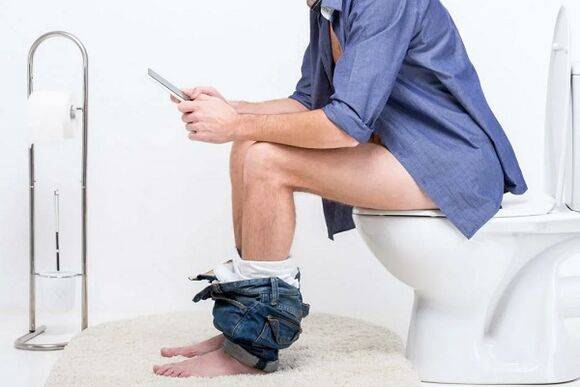
To improve stool, doctors recommend eating more vegetables and fruits, whole grains. These foods are rich in fiber, which increases the amount of stool and makes them softer. Prunes, fresh plums, kefir and other fermented dairy products have a natural laxative effect. For prolonged constipation, you can use laxatives or suppositories.
Subfebrile temperature
The thermometer reading rises to 37-37. 5 ° C as chronic prostatitis worsens. In this case, headaches, malaise, body aches and other typical symptoms of the disease are associated.
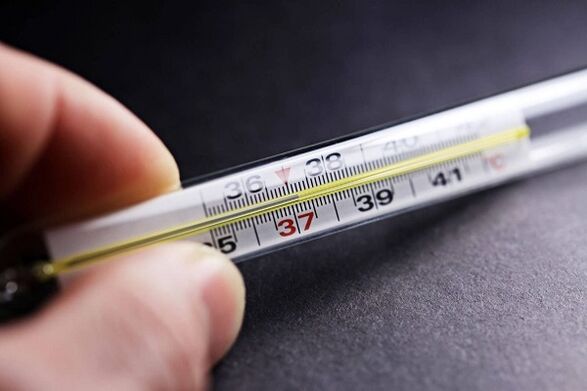
The use of antipyretics on medical thermometers is not appropriate for indications up to 38 degrees. Relapse should be treated as a result of a subfebrile condition.
Weakening erection
Chronic prostatitis can cause sexual problems not only in old age but also in young men after 30 years.

Patients complain that the erection during arousal is not solid enough. This causes both psychological and physical discomfort. Fearing "failure, " the man avoids sexual intercourse, which further aggravates the problem.
There are many folk remedies like treating potency problems. Just a few of these: thyme and rosehip decoction, rowan tincture, use of propolis. It is recommended for a person to consume more celery, which has a good effect on erection, and drink ginger tea.
Decreased performance
In chronic prostatitis, a person feels constant weakness, fatigue, irritability and nervousness.

Concentration and memory inevitably decrease, and routine work tasks become more difficult. The symptom also applies to physical work: even with less sports training or effort, there are muscle aches and severe fatigue.
During such a period, it is important that you take care of yourself, rest a lot, and do not try to complete every task to the maximum. After treating the prostatitis (or at least achieving stable remission), the unpleasant symptoms disappear and then work can fall backwards.
Unable to conceive a child
With the asymptomatic course of chronic prostatitis, men often complain to a doctor that they cannot have a child.
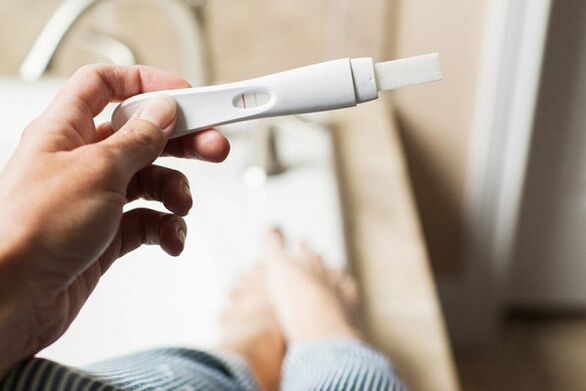
Patients say they have no pain and frequent urination, and even everything in sex can be normal. This possibility of developing a pathology is considered unfavorable as it means that a person already has an advanced form of the disease.
The production of viable and active sperm is a serious process that is regulated by the gonads and the brain. No folk prescription and symptomatic cure will help in this case, it is important to study and solve the problem at the medical level.
Opinions: opinions of men in the forums
- "I received signs of prostatitis more than a year ago. At first there was a slight pull in the groin and perineum, then the pain intensified. I noticed that I wake up 2-3 times a night to go to the toilet. I did not attach much importance. I thought I was freezing somewhere or sitting in a draft. Then the sexual problems started: the erection was unstable, the sensitivity decreased, there were no vivid feelings during orgasm. At work, a colleague of mine advised me to be a bee. I took it for several months (in the form of a tincture, I bought it from a local beekeeper), the condition improved, the pains disappeared. "
- - The scrotum, the perineum and the lower abdomen stretched. Sometimes a few drops of pus came out of the urethra. I read reviews on the internet where men described the same symptoms, went to the doctor, and were diagnosed with prostatitis. I know the disease is severe, so I decided not to postpone treatment. The hospital did a lot of examinations and ultrasounds, prescribing pills. Prostatitis has healed, but intestinal problems have begun, probably due to antibiotics. Then I had to buy probiotics for another 2 months, then all kinds of kefir and yoghurts to remove the abdominal discomfort. "
- "For a long time, I thought I had some digestive problems. "I didn’t even know about prostatitis - I didn’t know that my lower abdomen hurt and my stools were disturbed. These were exactly my symptoms. I even started visiting the restroom a little, but at first I didn’t pay attention to that sign. It’s still good that I still decided to go to the urologist. I was diagnosed with chronic prostatitis. They treated me for a long time, drank different pills, put candles. To be honest, I don’t even remember the names, it somehow flew out of my head. I'm feeling good now. "
- "I know first-hand what prostatitis is. For me, it all started suddenly: there were severe pain in the scrotum and suprapubic zone, the urge to urinate was literally every 30 minutes. I suffered so much for a few days and went to the urologist. They did a urine test and an ultrasound of the prostate, took a smear, and the doctor wanted to see what was rectally with my finger, but I usually refused. . . It turned out that "acute prostatitis" developed. The doctor prescribed antibiotics. After 2 weeks I completely recovered, so far there have been no relapses, I hope they won’t be any more, it’s scary because they say prostatitis is incurable. "
findings
In any form of prostatitis, symptomatic therapy alone is not effective enough. NSAIDs or painkillers temporarily relieve pain and fever, and uroseptics help reduce microbial inflammation. But at the same time, the pathological process of the prostate gland continues to develop, becoming a chronic form. As a result, echographic changes (tissue sclerosis), erectile dysfunction appear, and the risk of prostate cancer increases.
In order for the disease not to cause sad consequences, a complex treatment of prostatitis is needed. The therapeutic regimen is prescribed by a doctor (urologist, less often - andrologist), taking into account the characteristics of the disease and the results of the test.



























